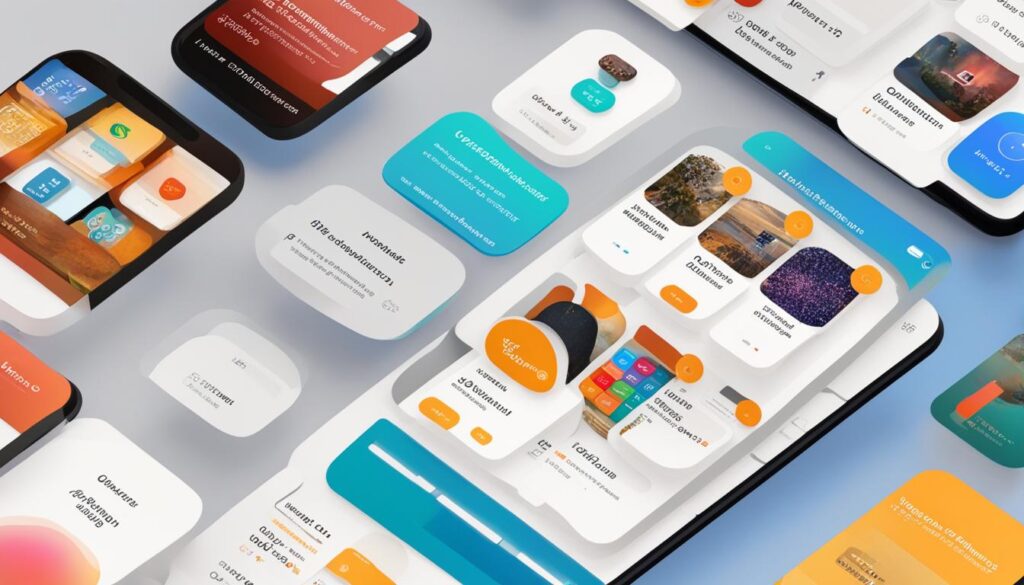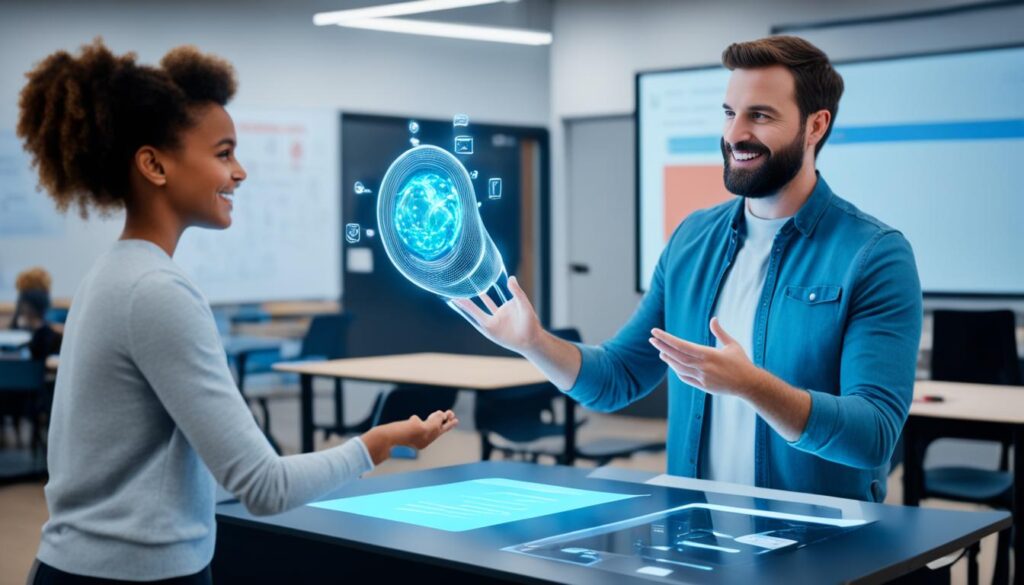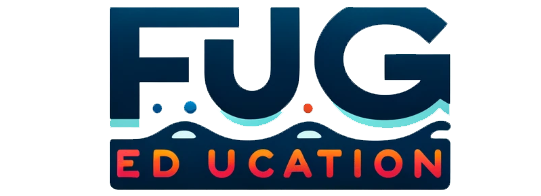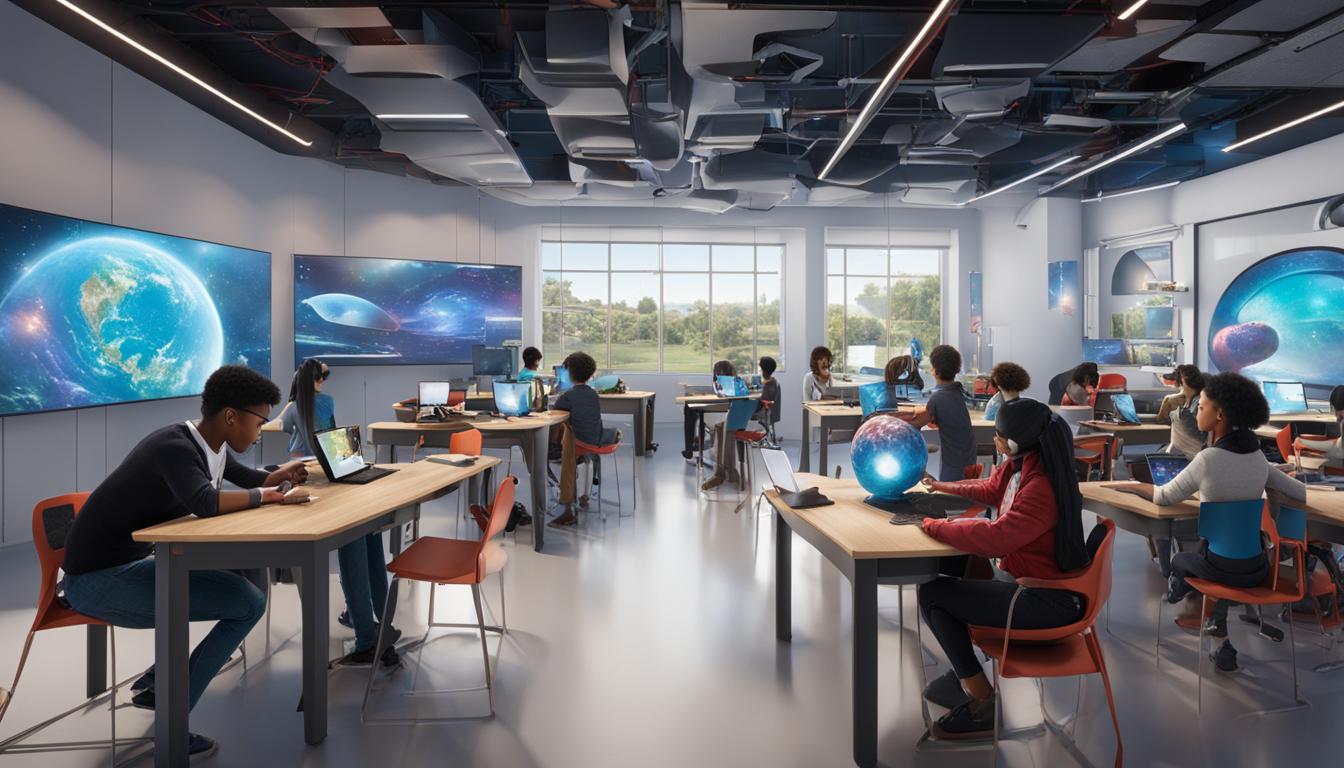In today’s rapidly evolving world, technology has permeated every aspect of our lives, including education. Traditional classroom models are giving way to innovative learning approaches, thanks in large part to the growing influence of artificial intelligence (AI) in learning technologies. As AI continues to advance, it is revolutionizing personalized education and reshaping the way students learn and educators teach.
In this article, we will delve into the myriad ways AI is transforming the education landscape by providing personalized learning experiences tailored to individual students. We will explore how AI is being integrated into learning technologies, enabling educators to cater to the unique needs and preferences of each student. From adaptive learning platforms to intelligent tutoring systems, AI is empowering students to achieve their full potential.
Key Takeaways:
- AI is revolutionizing personalized education by providing tailored learning experiences.
- Learning technologies powered by AI are shaping the future of education.
- AI enables adaptive assessments and personalized learning paths.
- Technology-enhanced classrooms with AI foster engaging and interactive learning environments.
- Proper implementation and training are essential to harness the full potential of AI in education.
Exploring the Intersection of AI and Personalized Learning
In this section, we will examine the intersection of AI and personalized learning. AI technologies are revolutionizing education by creating tailored learning experiences for students, catering to their individual needs and preferences. From intelligent tutoring systems to adaptive learning platforms, AI is transforming the way educators teach and students learn.
AI enables personalized learning by analyzing vast amounts of data and providing personalized recommendations and insights. With AI-powered tools, educators can identify each student’s strengths, weaknesses, and learning style, allowing them to deliver targeted instruction and support.
One example of AI in personalized learning is intelligent tutoring systems. These systems use machine learning algorithms to adapt content and delivery based on individual student performance, ensuring that each student receives the right level of challenge and support.
“AI technologies are revolutionizing education by creating tailored learning experiences for students, catering to their individual needs and preferences.”
Adaptive learning platforms are another application of AI in personalized learning. These platforms use AI algorithms to dynamically adjust content, pacing, and difficulty based on each student’s progress, maximizing engagement and learning outcomes.
Furthermore, AI can analyze students’ performance data to provide real-time feedback and identify areas where additional support may be required. This timely feedback helps students identify their strengths and areas for improvement, facilitating self-directed learning and growth.
By leveraging AI in personalized learning, educators can create individualized learning pathways that empower students to reach their full potential. With personalized instruction, students can learn at their own pace, focus on areas of interest, and develop essential skills for the future.
Understanding AI’s Role in Shaping Edtech Trends
In this section, we will explore AI’s role in shaping edtech trends. AI has revolutionized the field of education technology, influencing the development of digital learning tools and e-learning technology that are transforming the way we teach and learn.
The Rise of Digital Learning Tools and E-Learning Technology
AI has played a significant role in the rise of digital learning tools and e-learning technology. These tools, powered by AI algorithms and machine learning, provide personalized and interactive learning experiences for students. From online courses to interactive simulations, digital learning tools have made education more accessible and engaging.
With AI, e-learning technology has evolved to cater to the unique needs of individual learners. AI algorithms can adapt to the learner’s pace, preferences, and learning style, providing tailor-made content and resources. This personalized approach enhances students’ learning outcomes and fosters a deeper understanding of the subject matter.
AI Integration in Classroom Settings: Opportunities and Challenges
In this section, we will delve into the opportunities and challenges of AI integration in classroom settings. AI has the potential to revolutionize education by offering personalized instruction and real-time feedback to students. Let’s explore the benefits and challenges of incorporating AI in the classroom.
One of the main opportunities of AI integration in classrooms is the ability to provide personalized instruction. AI-powered educational platforms can analyze individual student data and tailor lessons based on their strengths, weaknesses, and learning styles. This personalized approach helps students engage with the material more effectively and at their own pace, leading to improved learning outcomes.
Another advantage of AI in the classroom is the ability to provide real-time feedback to students. AI can instantly assess student work and provide immediate feedback, helping students identify and rectify any mistakes or misconceptions. This helps students to continuously improve their understanding and performance, fostering a more interactive and engaging learning environment.
Despite the numerous opportunities, there are also challenges associated with AI integration in classrooms. One significant challenge is privacy concerns. With AI systems collecting and analyzing student data, it is essential to ensure that privacy protections are in place to safeguard sensitive information. Schools and educators must prioritize data security and establish clear guidelines for the ethical use of student data.
Another challenge is the need for proper training and support for educators. Integrating AI into the classroom requires teachers to develop new skills and adapt their teaching methods. Educators need training programs and ongoing professional development opportunities to effectively incorporate AI tools and technologies in their teaching practices.
In conclusion, AI integration in classroom settings presents exciting opportunities for personalized instruction and real-time feedback. However, it also poses challenges such as privacy concerns and the need for proper training. By addressing these challenges and harnessing the power of AI in education, we can create transformative learning experiences for students and empower them for success in the digital age.
The Transformational Power of AI in Education Technology
In today’s rapidly evolving technological landscape, artificial intelligence (AI) is revolutionizing the field of education and transforming traditional teaching and learning methodologies. With its ability to analyze vast amounts of data, adapt to individual learning needs, and create personalized experiences, AI has the potential to greatly enhance educational software solutions and shape cutting-edge classroom technology.
Leveraging AI for Enhanced Educational Software Solutions
One area where AI is revolutionizing education is in the development of educational software solutions. By leveraging AI algorithms, developers can create interactive and adaptive learning platforms that cater to the unique needs of each student. Through continuous analysis of student performance and learning patterns, AI-powered software can provide personalized recommendations, adaptive assessments, and targeted interventions, ultimately improving students’ academic outcomes and engagement levels.

AI’s Role in Crafting Cutting-Edge Classroom Technology
In addition to enhancing educational software, AI is also playing a pivotal role in crafting cutting-edge classroom technology. For example, the integration of AI-powered smart boards allows for more interactive and dynamic lessons, where students can actively engage with learning materials through touchscreens, digital pens, and real-time feedback. AI is also being utilized in the development of assistive technologies for students with disabilities, such as speech recognition and text-to-speech capabilities, enabling inclusive and equitable educational experiences.
As AI continues to advance, we can expect even more innovative applications in the classroom, such as intelligent tutoring systems, virtual reality simulations, and personalized educational robots. These technologies have the potential to revolutionize the way students learn and educators teach, creating dynamic, immersive, and inclusive learning environments.
Innovations in Education Technology
In this section, we will discuss the latest innovations in education technology. These advancements are revolutionizing the way students learn and educators teach, creating more engaging and interactive learning environments.
One of the emerging trends in education technology is gamification. Gamification involves incorporating game design elements into educational activities, making learning more enjoyable and motivating for students. By using game-like features such as rewards, levels, and challenges, educators can enhance student engagement and encourage active participation in the learning process.
Another innovative technology that is transforming education is augmented reality (AR). AR allows students to experience virtual objects and scenarios in real-world settings, providing them with immersive and interactive learning experiences. For example, students can explore ancient ruins or simulate science experiments through AR applications, bringing subjects to life and enhancing their understanding of complex concepts.
Adaptive learning systems are also making significant strides in education technology. These systems utilize AI algorithms to personalize learning experiences for students. By analyzing individual strengths and weaknesses, adaptive learning platforms can deliver tailored content and learning pathways that cater to the specific needs of each student. This approach promotes individualized learning and maximizes the effectiveness of instruction.
“Innovations in education technology, such as gamification, augmented reality, and adaptive learning systems, are reshaping the educational landscape and transforming traditional teaching methods.”
| Innovation | Description |
|---|---|
| Gamification | Incorporates game design elements into educational activities, making learning more enjoyable and motivating for students. |
| Augmented Reality | Allows students to experience virtual objects and scenarios in real-world settings, providing immersive and interactive learning experiences. |
| Adaptive Learning Systems | Utilizes AI algorithms to personalize learning experiences for students, delivering tailored content and learning pathways. |
Adding Personal Touch to Learning with AI
In today’s rapidly evolving educational landscape, AI is not only transforming the way we teach and learn, but also adding a personal touch to every student’s educational journey. By leveraging the power of AI, educators can customize learning experiences and create individualized learning pathways that cater to the unique needs and preferences of each student. This personalized approach has the potential to revolutionize education, making it more engaging, effective, and tailored to every learner.
Customizing Learning Experiences with Generative AI
A key aspect of adding a personal touch to learning with AI is the use of generative AI technologies. Generative AI algorithms have the ability to analyze vast amounts of data and generate customized learning content that aligns with students’ interests, learning styles, and skill levels. Whether it’s creating interactive simulations, generating personalized quizzes, or designing tailored lesson plans, generative AI enables educators to deliver content that resonates with each student, promoting deep understanding and knowledge retention.
The Impact of AI on Individualized Learning Pathways
AI’s impact on individualized learning pathways cannot be overstated. By harnessing the power of machine learning algorithms, educators can analyze vast amounts of data on students’ performance, preferences, and learning patterns. This analysis allows AI systems to adapt and adjust learning pathways in real-time, providing students with personalized recommendations, resources, and challenges that meet their specific learning needs. This tailoring of education ensures that students are engaged, motivated, and challenged at their appropriate level, ultimately fostering a deeper and more meaningful learning experience.
However, the implementation of individualized learning pathways using AI is not without its challenges. Educators must strike a balance between personalization and standardization, ensuring that students receive a comprehensive education while still benefiting from tailored instruction. Additionally, privacy and data security concerns must be carefully addressed to protect students’ sensitive information and maintain their trust in the educational system.
Despite these challenges, the potential of adding a personal touch to learning with AI is immense. By embracing the power of AI to customize learning experiences and create individualized learning pathways, we are paving the way for a future where education is truly tailored to every student’s unique needs, unlocking their full potential and fostering a lifelong love for learning.
Evolution of Teacher Roles with Emerging Technologies in Education
In this section, we will discuss the evolution of teacher roles with the emergence of new technologies in education. We will explore how AI is transforming the traditional role of educators, from facilitators to designers of personalized learning experiences.
As emerging technologies continue to revolutionize the education landscape, teachers are finding themselves at the forefront of this transformation. No longer confined to the traditional role of imparting knowledge, educators now have the opportunity to harness the power of AI and other innovative tools to create personalized and engaging learning experiences for their students.
With the evolution of teacher roles, AI is enabling educators to become designers of personalized learning journeys. By leveraging emerging technologies in education, teachers can customize learning paths, adaptive assessments, and interactive content to cater to the individual needs and strengths of each student.
This shift in teacher roles emphasizes the importance of teacher training and professional development in keeping educators up-to-date with the latest advancements in education technology. Educational institutions must invest in robust training programs to equip teachers with the skills and knowledge they need to effectively incorporate AI and emerging technologies into their teaching practices.
The integration of AI in education is not meant to replace teachers, but rather to augment their capabilities and enhance the learning experience. With AI-powered tools, teachers can monitor student progress, provide real-time feedback, and identify areas of improvement, allowing them to better support each student’s unique educational journey.
The future of education lies in the synergy between educators and emerging technologies. By embracing AI and other innovative tools, teachers can unlock new possibilities for personalized learning, foster creativity and critical thinking, and prepare students for the digital age.
As we continue to witness the evolution of teacher roles with emerging technologies, it is crucial that we support educators in embracing these changes and equip them with the resources they need to thrive in this new educational landscape. Together, we can revolutionize education and empower the next generation of learners.
Educational Innovation: Preparing for the Future with AI-Powered Tools
In today’s rapidly evolving world, educational innovation is crucial to preparing students for the future. With the rise of AI-powered tools, educators have the opportunity to provide students with cutting-edge learning experiences that promote critical thinking, creativity, and problem-solving skills.
Equipping Educators with Digital Transformation Strategies
To effectively incorporate AI in their teaching practices, educators must be equipped with digital transformation strategies. This involves providing teachers with the necessary training and resources to adapt to the changing landscape of education. By empowering educators with the knowledge and skills to harness the power of AI, schools can ensure that students receive the best possible education that prepares them for the digital era.
How AI is Shaping the Future of Edtech and Learning
The future of education is closely intertwined with AI. AI-powered tools have the potential to revolutionize the edtech industry and transform the way students learn. From personalized learning platforms that adapt to individual student needs to intelligent tutoring systems that provide tailored feedback, AI is reshaping the way education is delivered.
With AI, students can benefit from personalized learning experiences that cater to their unique learning styles and abilities. AI algorithms analyze data and provide real-time insights to help educators tailor their instruction to individual student needs. This level of personalization not only enhances student engagement and motivation but also improves learning outcomes.
Furthermore, AI-powered tools have the capacity to identify learning gaps, predict student performance, and provide targeted interventions. This allows educators to intervene early and provide additional support to students who may be struggling, ultimately improving student success rates.

Monitoring and Regulation of AI in Education: A Discussion on Ethical Implications
In this section, we will discuss the monitoring and regulation of AI in education. As AI continues to be integrated into various aspects of education, it is essential to consider the ethical implications that arise from its use.
AI technologies have the potential to greatly enhance the learning experience for students, providing personalized instruction and adaptive assessments. However, there are concerns regarding data privacy and algorithmic bias that need to be addressed.
Data privacy is a paramount concern in the use of AI in education. Collecting and analyzing student data can lead to valuable insights, but it also raises questions about how that data is stored, secured, and used. Schools and institutions must have proper safeguards in place to protect student privacy and ensure that data is used ethically.
Algorithmic bias is another ethical consideration when it comes to AI in education. Machine learning algorithms can inadvertently perpetuate biases present in the data they are trained on. This can result in unfair outcomes or discriminatory practices. It is crucial to monitor and regulate AI systems to minimize bias and ensure fair and equitable education for all students.
Responsible AI use is essential to ensure that AI in education benefits students while safeguarding their rights and well-being. Guidelines and regulations should be established to promote transparency, accountability, and ethical practices in the development and implementation of AI technologies in educational settings.
Conclusion
In conclusion, the impact of AI on educational paradigms cannot be overstated. AI technology has revolutionized the way we teach and learn, offering immense potential for future advancements in education. From personalized learning paths to adaptive assessments, AI-powered tools have enhanced the educational experience for both students and educators.
By embracing the digital era, we can harness the transformative power of AI to pioneer innovative education experiences. As AI continues to evolve, it holds the promise of creating interactive and personalized learning environments that cater to the unique needs and preferences of every student. This powerful combination of technology and education has the potential to empower students, equipping them with the skills and knowledge needed to thrive in the digital age.
As we move forward, it is essential to recognize the importance of responsible AI use. Striking a balance between leveraging AI’s capabilities and ensuring ethical practices is crucial. Monitoring and regulating AI in education is necessary to address concerns such as data privacy and algorithmic bias, safeguarding the rights and well-being of students.
In conclusion, AI’s impact on educational paradigms is transformative. By embracing the digital era and leveraging AI-powered tools, we can revolutionize education, empowering students and educators to thrive in the ever-changing landscape of the future.
FAQ
What is the impact of AI in learning technologies?
AI is revolutionizing personalized education by transforming the education landscape and enhancing learning experiences for students. It enables educators to create tailored learning paths and adaptive assessments, shaping the future of education.
How is AI being used to create personalized learning experiences?
AI technologies such as intelligent tutoring systems and adaptive learning platforms enable educators to cater to the individual needs and preferences of each student, creating customized and engaging learning experiences.
How does AI shape edtech trends?
AI facilitates tech-driven education and learning by powering digital learning tools, e-learning technology, virtual reality in classrooms, and AI-powered adaptive assessments. It revolutionizes education and enhances learning experiences.
What are the opportunities and challenges of AI integration in classrooms?
AI in the classroom offers benefits such as personalized instruction and real-time feedback. However, challenges such as privacy concerns and the need for proper training must be addressed for successful AI integration.
How does AI transform education technology?
AI enhances educational software solutions by making them more interactive and personalized. It also contributes to cutting-edge classroom technology, including smart boards and assistive technologies for students with disabilities.
What are the latest innovations in education technology?
Innovations such as gamification, augmented reality, and adaptive learning systems are revolutionizing how students learn and educators teach. These innovations create more engaging and interactive learning environments.
How does AI add a personal touch to learning experiences?
Generative AI is used to customize learning content and create unique learning pathways for each student. AI also impacts individualized learning pathways, presenting both benefits and challenges for tailored education.
How is AI transforming teacher roles with emerging technologies?
AI is transforming the traditional role of educators from facilitators to designers of personalized learning experiences. Teacher training and professional development are crucial in effectively incorporating AI in teaching practices.
How is AI preparing students for the future with educational innovation?
AI-powered tools and digital transformation strategies are equipping educators to prepare students for the future. AI shapes the future of edtech and learning, from personalized learning platforms to intelligent tutoring systems.
What are the ethical implications of AI in education and how is it regulated?
AI raises concerns related to data privacy and algorithmic bias. Responsible AI use requires guidelines and regulations to ensure student rights and well-being are safeguarded while benefiting from AI in education.
How does AI impact educational paradigms?
AI transforms the way we teach and learn and paves the way for future advancements in education. Embracing the digital era and leveraging AI pioneer transformative education experiences that empower students and educators alike.
Source Links
- https://economictimes.com/tech/technology/majority-of-educators-call-for-govt-monitoring-of-ai-development-use-cases/articleshow/107215397.cms
- https://www.toolify.ai/ai-news/the-value-of-college-education-in-the-age-of-ai-796920
- https://economictimes.com/tech/startups/genai-to-contribute-100-billion-in-healthcare-savings-in-asia-pacific-by-2025/articleshow/107215070.cms

